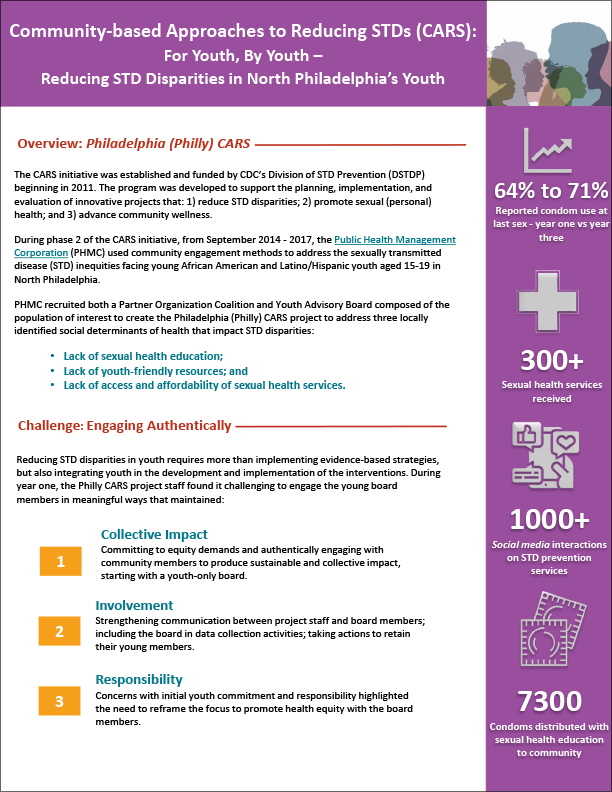Community-based Approaches to Reducing STDs (CARS):
Philadelphia Youth Address Disparities
The CARS initiative was established and funded by CDC’s Division of STD Prevention (DSTDP) beginning in 2011. The program was developed to support the planning, implementation, and evaluation of innovative projects that: 1) reduce STD disparities; 2) promote sexual (personal) health; and 3) advance community wellness.
During phase 2 of the CARS initiative, from September 2014 – 2017, the Public Health Management Corporation (PHMC) used community engagement methods to address the sexually transmitted disease (STD) inequities facing young African American and Latino/Hispanic youth aged 15-19 in North Philadelphia.
PHMC recruited both a Partner Organization Coalition and Youth Advisory Board composed of the population of interest to create the Philadelphia (Philly) CARS project to address three locally identified social determinants of health that impact STD disparities:
- Lack of sexual health education;
- Lack of youth-friendly resources; and
- Lack of access and affordability of sexual health services.
64% to 71% reported condom use at last sex – year one vs year three
300+ sexual health services received
1000+ social media interactions on STD prevention services
7,300 condoms distributed with sexual health education to community

Reducing STD disparities in youth requires more than implementing evidence-based strategies, but also integrating youth in the development and implementation of the interventions. During year one, the Philly CARS project staff found it challenging to engage the young board members in meaningful ways that maintained:
Collective Impact
Committing to equity demands and authentically engaging with community members to produce sustainable and collective impact, starting with a youth-only board.
Involvement
Strengthening communication between project staff and board members; including the board in data collection activities; taking actions to retain their young members.
Responsibility
Concerns with initial youth commitment and responsibility highlighted the need to reframe the focus to promote health equity with the board members.
In order to promote authentic community engagement with the young board members, the Philly CARS project provided:
Leadership Development – Members completed the Youth Leadership Institute which equipped them with STD 101 knowledge and the opportunity to serve as “peer advocates” with incoming recruits. They facilitated trainings through a youth-to-youth model – increasing the trust and relatability of the sexual health content delivered among their peers.
Recruitment Involvement – After two months, the board helped recruit additional members from their own social networks and at the CARS events that they planned and coordinated. By the end of year one, the board grew from eight to 27 members.
Intervention Design – The board planned the logistics around hosting STD awareness events to reach the target audience and promote a “stigma-free” environment. Philly CARS coordinated innovative community testing events like a local basketball game that provided 300 community members with sexual health services, food, and fun.
Sub-Committees – Board members collectively agreed to become more autonomous in project design through the creation of sub-committees. Social media, events & planning, and advocacy committees were established to focus on communication, engagement, and policy efforts for STD prevention.
Incentives – CARS project staff provided monetary incentives, meals, and “swag” (e.g., water bottles, t-shirts) for meeting attendance. Philly CARS project staff and partners aided board members with resume writing, references for school and job applications, and mentorship.
Engage authentically by committing to designing and implementing interventions created with and informed by community members.
Address retention concerns by ensuring that the board members are actively involved in the recruitment of additional members.
Avoid issues with commitment and responsibility by providing leadership development opportunities and incentives to community members.
Philly CARS connected youth to community organizations providing sexual-health services. Community events were associated with an increase in self-reported condom use from 64 to 71 percent among youth survey respondents between years one and three. The advisory board maintained an average of 20 members.
“It is exceeding my expectations, I love it here….[CARS Philly] lets me be myself. Not too many places let me be myself, so CARS really means a lot to me.”
– Board Member

For more information about the CARS initiative, please visit https://www.cdc.gov/std/health-disparities/cars.htm
